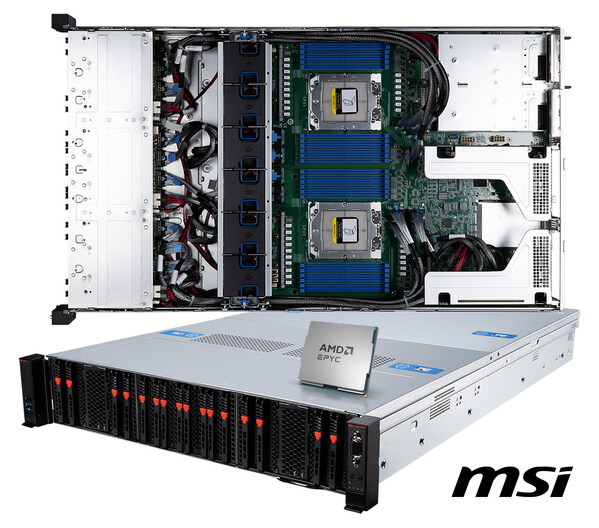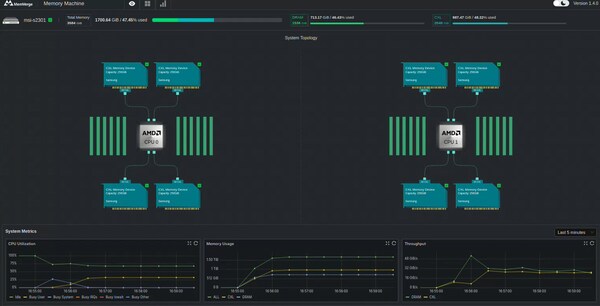Join the demonstration with Samsung and MemVerge to accelerate next-generation computing
SANTA CLARA, Calif., Aug. 7, 2024 /PRNewswire/ -- MSI, a leading global server provider, is showcasing its new CXL (Compute Express Link)-based server platform powered by 4th Gen AMD EPYC™ processors at The Future of Memory and Storage 2024, at the Samsung booth (#407) and Memverge booth (#1251) in the Santa Clara Convention Center from August 6-8. The CXL memory expansion server is designed to enhance In-Memory Database, Electronic Design Automation (EDA), and High Performance Computing (HPC) application performance.

MSI S2301 CXL Memory Expansion Server Boosts Application Performance with Support for CXL 2.0 Memory Expansion
New CXL Memory Expansion Server Redefines High-Performance Computing
CXL Memory Expansion is a cutting-edge technology designed to enhance both the bandwidth and capacity of system memory in modern computing environments. The CXL 2.0 standard introduces a high-performance memory access mechanism that allows expansion devices to directly interface with the CPU's memory hierarchy, treating the additional memory modules as if they were part of the system's native memory. By connecting CXL Memory Expansion devices to the system, organizations can scale up their memory resources efficiently, achieving both greater memory capacity and improved data throughput for high-performance computing tasks.
The newly announced MSI S2301 server is ready for select 5th Gen AMD EPYC CPUs and significantly boosts application performance through its support for CXL 2.0 Memory Expansion. By integrating CXL 2.0 over PCIe 5.0 x8 links in an E3.S-2T form factor, the S2301 server allows users to seamlessly add CXL-compliant memory expansion devices, effectively extending the server's memory resources beyond the limitations of traditional DRAM configurations. This capability enhances application performance in several ways: it increases the total amount of accessible system memory, high-performance computing tasks, and it improves memory bandwidth through direct, coherent access between the CPU and the additional memory modules. The high-speed CXL 2.0 interface enables rapid data transfer and low-latency communication between the server's core components and the expansion memory, ensuring that applications can handle larger datasets and more simultaneous processes without performance bottlenecks.
CXL Innovative Ecosystem
Samsung's introduction of the 256GB CXL memory modules based on CXL 2.0 is expected to accelerate the commercialization of next-generation memory solutions.
"Samsung welcomes the collaboration with MSI and AMD that will create a robust ecosystem for the CXL market and optimize the performance of our CXL 2.0 256GB CMM-D. The new CXL DRAM solution is expected to handle various workloads in MSI's S2301 system," said Jangseok Choi, vice president of the Memory New Business Planning Team at Samsung Electronics. "Samsung, MSI and AMD look forward to the momentum in innovation enabled through next-generation enterprise servers and data centers."
Memory Machine X software from MemVerge optimizes the cost and performance of AI and other memory-intensive workloads by intelligently managing tiers of memory. The software tells you if adding CXL memory is appropriate for your application environment and uses bandwidth or latency QoS policies to automatically place your data in the right memory tier for optimum performance.
According to Charles Fan, CEO and Co-founder of MemVerge, "The availability of servers with qualified CXL peripherals and software is a breakthrough for the industry. It marks the beginning of the industry's ability to satisfy pent-up demand from IT organizations ready to evaluate the added memory capacity and bandwidth expected from CXL."
The joint demonstration showcases the next-generation CXL interface, which allows for significant expansion of both total system memory capacity and bandwidth via the addition of CXL Memory Expansion devices. With its expandable bandwidth and capacity when used with main DRAM, the technology's advancement is expected to significantly impact the next-generation computing market.


